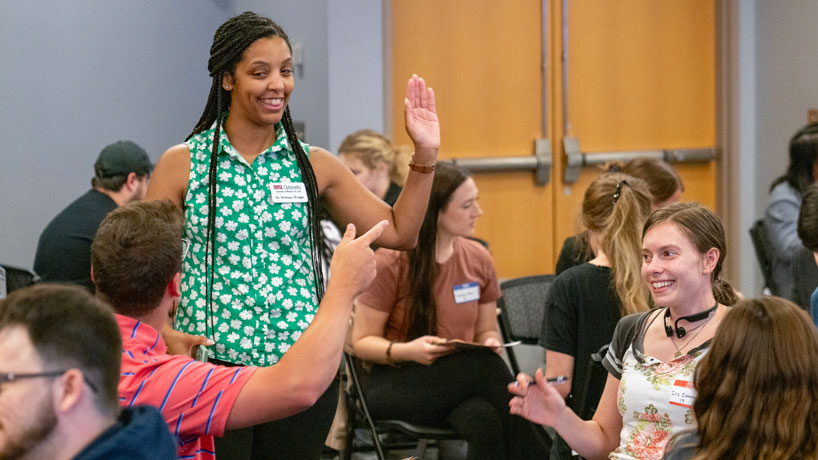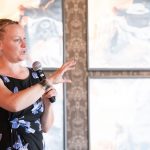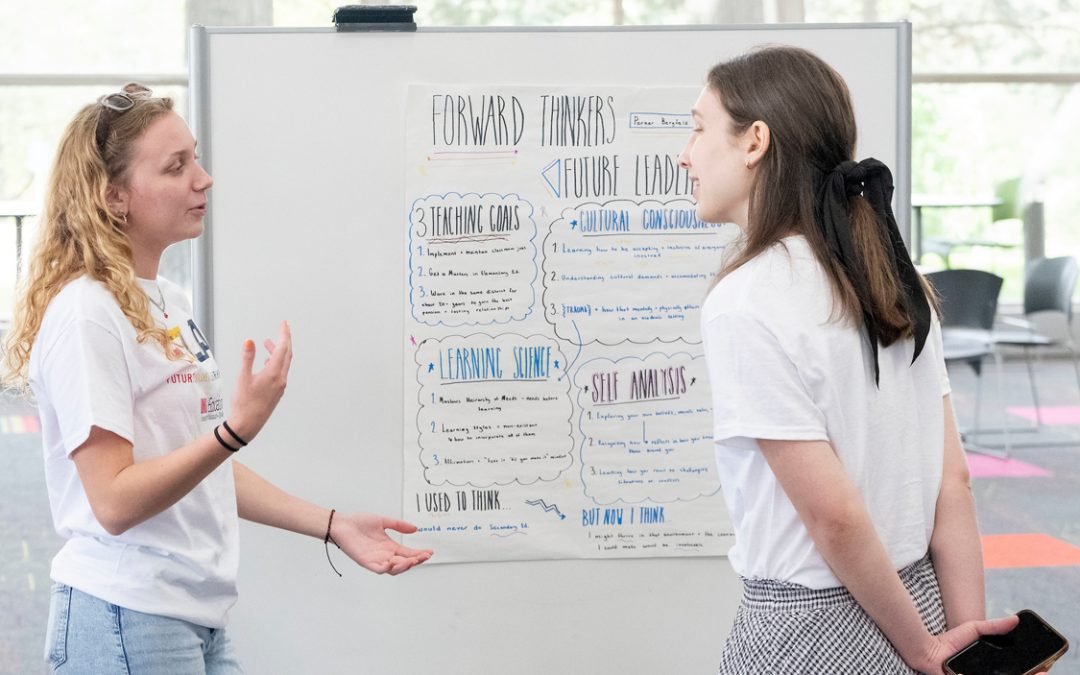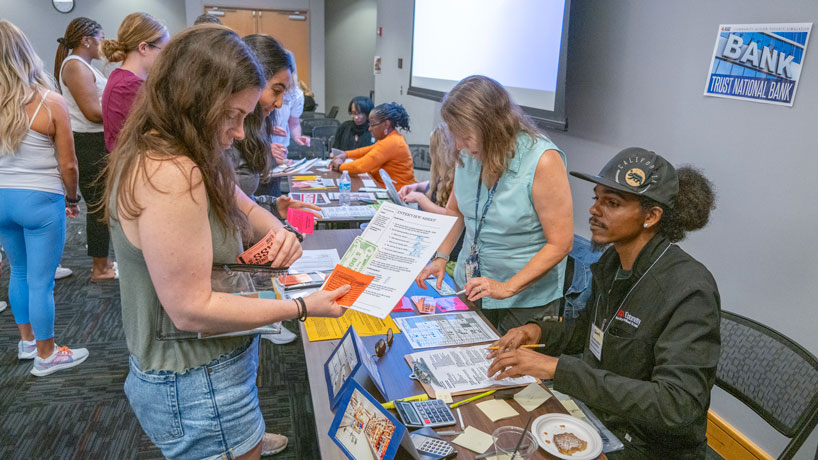
An UMSL student uses a combination of cash and assistance to purchase food during a simulation hosted by the College of Optometry and College of Nursing on July 10. The simulation was designed to expose participants to the complexities of poverty. (Photos by Derik Holtmann)
What would it feel like to walk a month in the shoes of someone experiencing poverty? An elderly person struggling to pay for both utilities and medications, perhaps, or a single parent without a car who needs to find a way to get to work each day? Those are the kinds of scenarios that students in the College of Optometry and College of Nursing at the University of Missouri–St. Louis were faced with last Monday as they participated in a simulation designed to expose participants to the complexities of poverty and its many impacts.
College of Optometry Dean Dr. Keshia Elder had previously participated in a similar simulation while working in Birmingham, Alabama, and approached Dr. Casey Hamm Peterson, the college’s coordinator of interprofessional education, and Dr. Brittany Wright about hosting a simulation on the UMSL campus.
“The purpose is to bring awareness to poverty and also to bring more understanding to it,” Hamm Peterson said. “I think that for a lot of people who haven’t experienced it, there’s a lot of misconceptions around blaming or placing fault on people who live in poverty, versus realizing that a lot of times there are these systematic failures that you are working against.”
Hamm Peterson and Wright worked with faculty in the College of Nursing, which had previously run the simulation a few years ago, to bring it to life in the Millennium Student Center Century Rooms. Students from the University of Health Sciences and Pharmacy in St. Louis were also invited to participate.
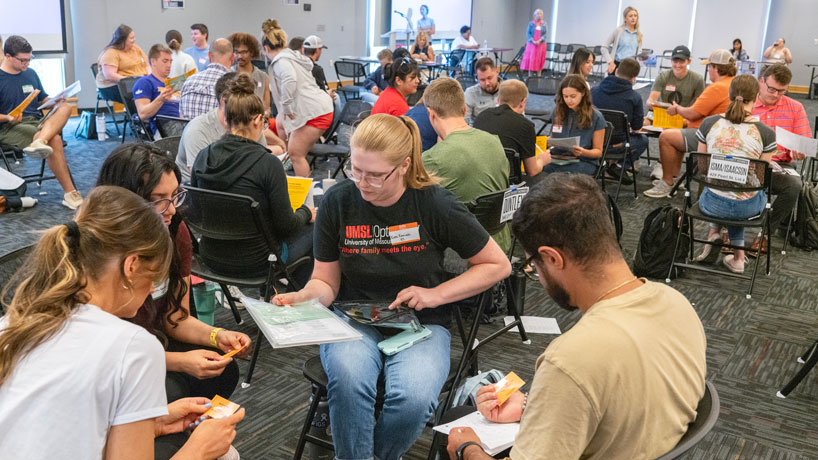
During the one-month simulation, which was broken down into 15-minute “weeks,” students played the roles of different members of families living in poverty. In between weeks, they were given time to discuss their approach to finances, health care, childcare and other life situations with the other members of their family.
Facilitated by the Missouri Community Action Network, the simulation allows participants to step into the shoes of someone experiencing poverty for a few hours. The simulation is broken into 15-minute segments, each of which represent one week of a month. Students were assigned to one of 26 different families all dealing with different circumstances, such as a young adult who must care for their siblings while their parent is incarcerated or an elderly couple raising their grandchildren while dealing with their own health issues. During UMSL’s event, which was sponsored by Alcon, each student played the role of a specific family member, and throughout each “week,” they had to overcome certain challenges and meet different needs for their family.
They visited community resources set up around the room, such as a bank, grocery store, school, workplace, health care clinic and social security office. Those playing the role of students filled out worksheets at school, while parents went to work. They often struggled to make ends meet, applying for benefits at the social services office and haggling with the owner of a pawn shop over the price of a television or microwave. In some cases, children who were left home alone while their parents were at work were picked up by a police officer, and a few families were evicted after failing to make their mortgage payments.
While the lessons learned through the simulation can be applied in a variety of workplaces and educational settings, Hamm Peterson and Wright feel the messages are especially important for current and future health care professionals. For that reason, they designed the event to involve UMSL students working in clinical patient care, including third-year optometry students and Accelerated BSN students.
“Our primary intent is to expose our students to experiences that their patients may be having that aren’t necessarily confined to the exam rooms,” Wright said. “It’s an opportunity for us to expose students to the idea that patients are beyond who they are in the exam room and that their life experiences and determinants of health that we may not be thinking about in the moment are all going to have an influence on their actual health outcomes. They’ve got all these other external pressures, especially when we think about living in poverty and how money is dispersed. Maybe that patient can’t afford the medication because they have to choose between putting food on the table or keeping the lights on and that prescription is just not something that can be filled this month because of the strain on their financial situation.”
“Many of these people will be their patients,” Hamm Peterson added. “So from our perspective, it can really bring a lot of understanding and better care when you’re thinking about things like compliance with medications, patients showing up late to appointments and things like that. A lot of times it’s not their choice to be doing that, but other factors that they’re dealing with – if the bus didn’t show up and now the patient’s late and we’re saying that we can’t see them anymore, for example. Having all those things in mind is really important for our students.”
With Hamm Peterson serving as the college’s coordinator of interprofessional education, the simulation was also intended for optometry students to learn from and alongside students in other health care professions. For that reason, students from optometry, nursing and pharmacy were intentionally mixed up into different family groups.
“In addition to just navigating what this may look like for patients, it’s also about working professionally with other health care providers and learning how we might share resources or help a patient in these situations beyond our individual professions alone,” Wright said.
The simulation also showed students firsthand how unexpected circumstances, such as a car breaking down, a child getting sick or someone get laid off from their job, can have a huge ripple effect on a family’s situation and, in turn, a patient’s access to care.
“The first week everything was going really well; we were in a homeless shelter and didn’t have all of our expenses so we were able to pay for all of our food and everything like that,” optometry student William Sigmund said. “But then unexpected things happen. We got kicked out of the homeless shelter the second week, so all of the sudden we didn’t have anywhere to stay. We thought we were doing really good, paying all of our bills and everything, and then we had to go buy a house. So even when things seem like they’re going smooth, bumps in the road happen. You have to be prepared for that or willing to stay on your toes.”
Going forward, the College of Optometry hopes to continue hosting the simulation as an annual event for students.

